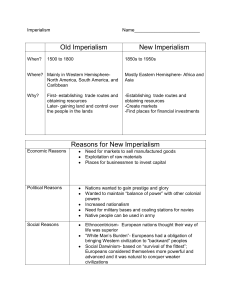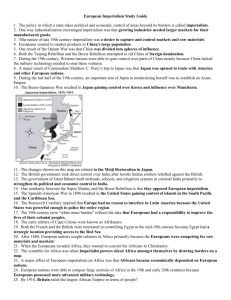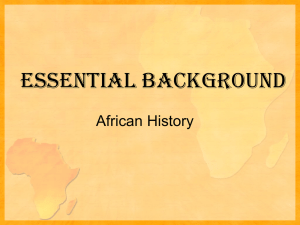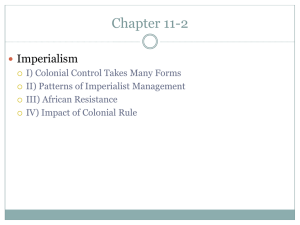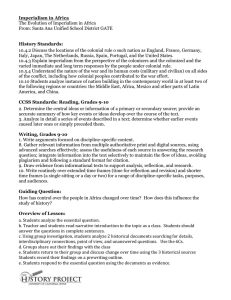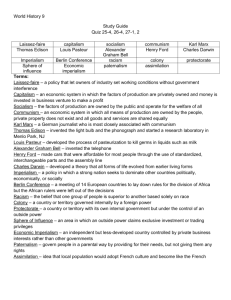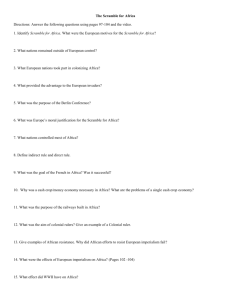Imperialism & World War I Quiz: Test Your Knowledge
advertisement
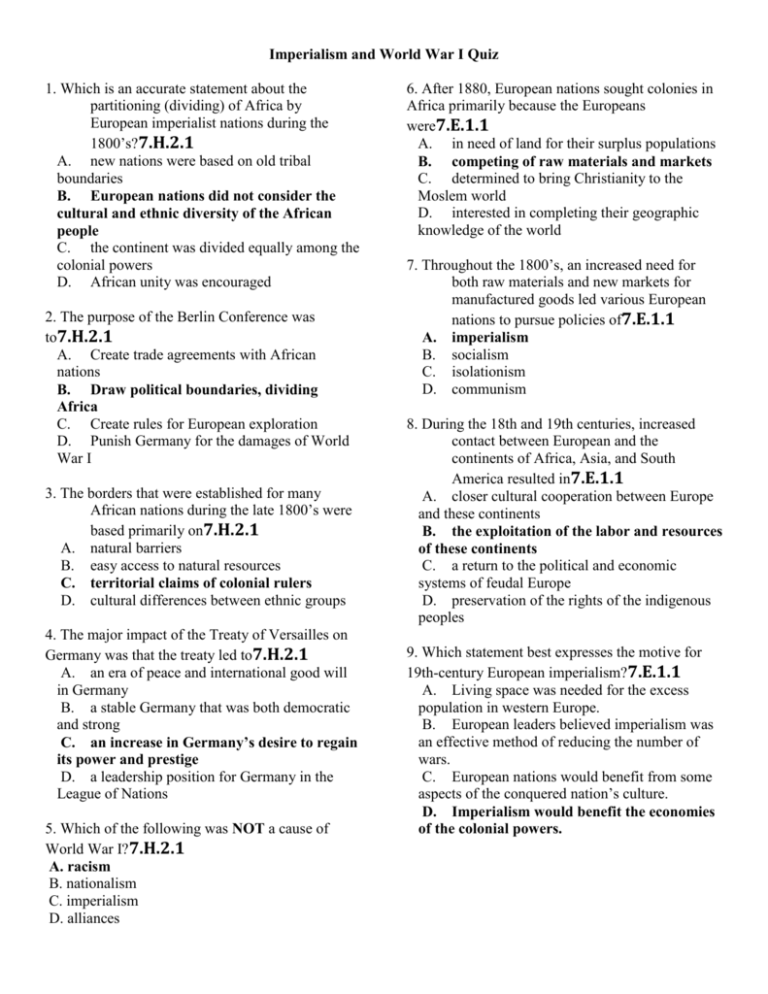
Imperialism and World War I Quiz 1. Which is an accurate statement about the partitioning (dividing) of Africa by European imperialist nations during the 1800’s?7.H.2.1 A. new nations were based on old tribal boundaries B. European nations did not consider the cultural and ethnic diversity of the African people C. the continent was divided equally among the colonial powers D. African unity was encouraged 2. The purpose of the Berlin Conference was to7.H.2.1 A. Create trade agreements with African nations B. Draw political boundaries, dividing Africa C. Create rules for European exploration D. Punish Germany for the damages of World War I 3. The borders that were established for many African nations during the late 1800’s were based primarily on7.H.2.1 A. natural barriers B. easy access to natural resources C. territorial claims of colonial rulers D. cultural differences between ethnic groups 4. The major impact of the Treaty of Versailles on Germany was that the treaty led to7.H.2.1 A. an era of peace and international good will in Germany B. a stable Germany that was both democratic and strong C. an increase in Germany’s desire to regain its power and prestige D. a leadership position for Germany in the League of Nations 5. Which of the following was NOT a cause of World War I?7.H.2.1 A. racism B. nationalism C. imperialism D. alliances 6. After 1880, European nations sought colonies in Africa primarily because the Europeans were7.E.1.1 A. in need of land for their surplus populations B. competing of raw materials and markets C. determined to bring Christianity to the Moslem world D. interested in completing their geographic knowledge of the world 7. Throughout the 1800’s, an increased need for both raw materials and new markets for manufactured goods led various European nations to pursue policies of7.E.1.1 A. imperialism B. socialism C. isolationism D. communism 8. During the 18th and 19th centuries, increased contact between European and the continents of Africa, Asia, and South America resulted in7.E.1.1 A. closer cultural cooperation between Europe and these continents B. the exploitation of the labor and resources of these continents C. a return to the political and economic systems of feudal Europe D. preservation of the rights of the indigenous peoples 9. Which statement best expresses the motive for 19th-century European imperialism?7.E.1.1 A. Living space was needed for the excess population in western Europe. B. European leaders believed imperialism was an effective method of reducing the number of wars. C. European nations would benefit from some aspects of the conquered nation’s culture. D. Imperialism would benefit the economies of the colonial powers. 10. The 19th century term “White Man’s Burden” reflects the idea that7.C.1.1 A. Asians and Africans were equal to Europeans B. Asians and Africans would be grateful for European help C. imperialism was opposed by most Europeans D. Europeans had a responsibility to improve the lives of the colonial peoples 11. The movements led by Mohandas Gandhi of India and Martin Luther King, Jr., of the United States are similar because both7.C&G.1.1 A. supported attempts to overthrow the established government B. advocated civil disobedience to bring about social change C. appealed solely to the upper classes for financial support D. resulted in their leaders gaining national political office British Influence Upon India British rule had an important effect on India’s way of life. They built schools which taught western values. English became the second language. A railroad system was built. This helped the economy grow, but also helped the British to move soldiers throughout the country to keep order. A telegraph system was constructed, which helped improve communications. Even farmers learned new western methods to help improve crop production. However, these advances did not help to change the strict rules of the caste system. People were still bound to their own social class. The lower castes remained illiterate. Traditional religious practices kept the social structure of the caste system alive. 13. What is one impact NOT listed as a result of British rule on India?7.C&G.1.2 A. B. C. D. The British language became the second language of India. The British built a railroad system. The British provided self-rule in government to the people of India. The British taught western style farming methods. Open Ended—Answer the following questions. 14. Define each cause of World War I7.H.2.1 15. List the countries that were a part of the Triple Entente (The Allies):7.H.2.1 MilitarismAlliancesImperialismNationalism- 16. List the countries that were a part of the Central Powers:7.H.2.1 17. What two events forced the United States to enter World War I in 1917?7.H.2.1 18. List three (3) innovations used during World War I 7.H.2.1 Short Answer—Answer ONE of the two questions below. Your answer should be thorough and in COMPLETE SENTENCES Factors such as natural resources, raw materials, technology, nationalism, and economics have all causes global conflict in one way or another. While studying Imperialism and World War I, we have learned about how some of these factors have led to global conflict. Explain how these factors have led to global conflict. 7.H.2.1 OR Why was there another global conflict so soon after World War I?
